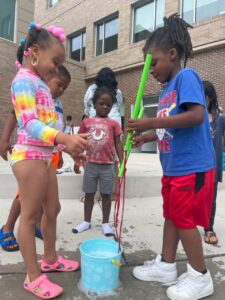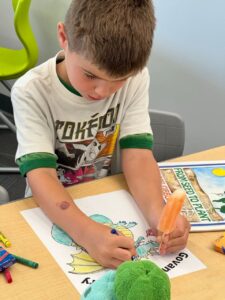By Maura Colleen Farrall, BCP Lead Academic Coach
 Summer break is a wonderful time for kids to relax, explore new interests, and recharge after a busy school year. But it’s also a time when many students experience a setback in their academic skills, especially in math and reading. This “summer slide” can leave children starting the new school year behind their peers — particularly in math, which tends to be the hardest subject to maintain over the break.
Summer break is a wonderful time for kids to relax, explore new interests, and recharge after a busy school year. But it’s also a time when many students experience a setback in their academic skills, especially in math and reading. This “summer slide” can leave children starting the new school year behind their peers — particularly in math, which tends to be the hardest subject to maintain over the break.
The Northwest Evaluation Association (NEWA), the national testing group used by Baltimore Curriculum Project (BCP), discovered that “the average student lost 17% to 34% of the prior year’s learning gains during summer break.” That’s more than a full month of instruction lost over the summer.
Summer learning loss adds up. Over time, the summer slide is a major contributor to low reading comprehension scores in high school (source: Kappan R&D). And summer learning loss is compounded by the pandemic learning loss. When students return to school having forgotten what they learned, they spend precious months catching up instead of moving ahead.
Preventing this loss is key to ensuring that a child starts the next grade confident and ready to learn new concepts. Parents play a crucial role in helping their child stay on track with summer learning and enrichment. It doesn’t have to mean extra work or stress. With simple, enjoyable activities, you can keep your child’s brain engaged all summer long.
Fun Ways to Keep Skills Strong
 You don’t need complicated schedules or expensive programs to keep your child learning over the summer. Here are some easy ideas that fit easily into everyday life:
You don’t need complicated schedules or expensive programs to keep your child learning over the summer. Here are some easy ideas that fit easily into everyday life:
- Reading for Pleasure: Encourage your child to read daily—just 15 minutes a day can make a big difference. Let them pick books they enjoy, whether it’s comics, fantasy, or nonfiction. Chatting about stories together will deepen their understanding and make reading more meaningful.
- Writing in a Journal: Keeping a daily journal is a great way to build writing skills. Your child can write about their day no matter their age. Older scholars can write stories or write about their day. Young learners can draw pictures and write words. Providing them with a special notebook and fun pens or crayons can make this activity more exciting.
- Playing Math Games: Free online games make practicing math facts and problem-solving fun and interactive. Older kids might enjoy platforms like Khan Academy, which offer lessons tailored to their level. Let your child choose which sites or games they like best to keep them motivated.
Make Learning Fun and Child-Led
 Children are more likely to stick with learning activities when they have a say in what they do. Visiting your local library is a fantastic way to offer variety—kids can explore different books, participate in summer reading challenges, and even get advice from librarians. Allow your child to decorate their writing journal. and choose from two or three online math games, creating a sense of ownership that encourages consistency.
Children are more likely to stick with learning activities when they have a say in what they do. Visiting your local library is a fantastic way to offer variety—kids can explore different books, participate in summer reading challenges, and even get advice from librarians. Allow your child to decorate their writing journal. and choose from two or three online math games, creating a sense of ownership that encourages consistency.
Parents’ Impact on Learning
The most important thing you can do is to support and encourage your child. As a parent you are the first and most valuable teacher your child has. Show interest in the books they read, ask about their journal entries, and even join in on math games. Your involvement sends a powerful message that learning is valuable and enjoyable.
Remember, even a few minutes each day can add up to a big impact. With your support, your child can enjoy a summer filled with fun, growth, and readiness for the school year ahead.

